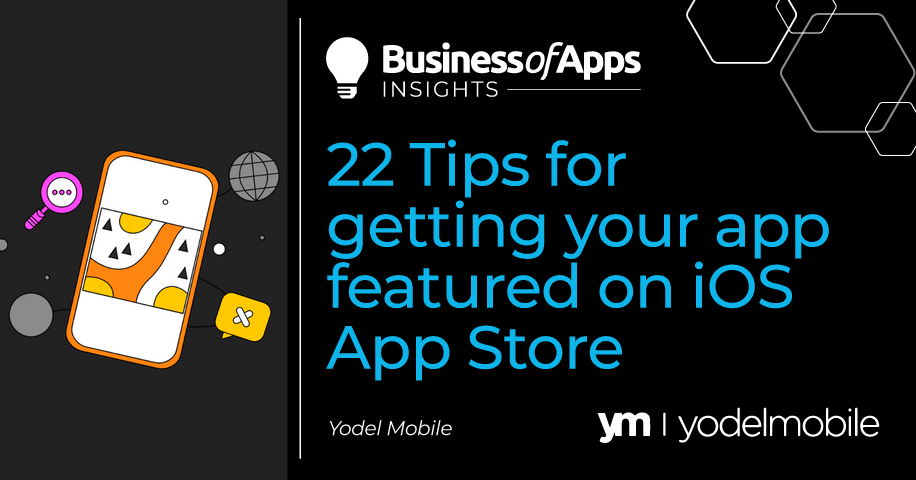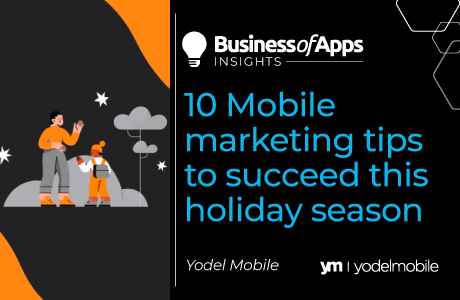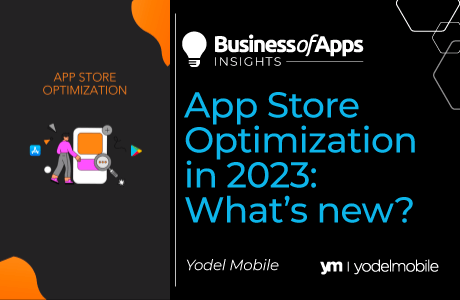Getting on the homepage of Apple’s App Store is like bagging a beachfront property, complete with a bathroom for every bedroom and electric gates. It’s gold star real estate, and it’s the dream of most app teams to see their app featured.
Unfortunately, much like SEO, there is no guarantee that if you do the work, you’ll get featured in the App Store. However, much like SEO, the potential rewards are great enough that it’s worth spending time putting together a compelling proposition.
This post was first published on yodelmobile.com.
After all, it stands to reason that a great big splashy graphic promoting your app as Today’s Pick will get you more impressions and downloads. But there’s also a halo effect. More downloads will mean that you rank better for the keywords you’re optimising for, so while you won’t be featured permanently somewhere so prominent, there will be a positive longtail effect on your downloads.
Sounds good, right? Clear your diary, and let’s get to it.
Submit your app
Open this page: this is where you submit your “sell” to the real-life humans working behind the scenes. Be clever with what you write as they are the people you want to impress!
Be bug-free
Apps are tested and decisions are made by actual humans, so it should go without saying that you should only submit your app when it’s bug-free and on point. You can use Apple’s TestFlight to find beta testers to help with this. If you’re still ironing out kinks, delay your submission.
Get your ASO up to scratch
App Store Optimisation is a whole other post but without optimising your listing properly, there’s very little chance your app will get featured. Each element of your app store listing is important here, and there are some rules you can follow, but don’t be afraid to update regularly and keep seasonality and trends front of mind. When Peloton included “at home fitness” during the pandemic, their downloads tripled in a matter of weeks!
Pitch in advance
Here’s the caveat to delaying your launch – if you’re about to launch a major upgrade or feature, Apple recommends you submit your application 6-8 weeks in advance.
Metrics matter
If you’ve got a low churn rate and high user engagement, you’ll be considered a high-quality app and stand a better chance of being featured. (We’ve got a great report on combating user churn so make sure you check it out!)
Unify your data from app stores in one dashboard
With benchmarking tools, Data.ai’s latest data product allows you to see how your app contrasts to market estimates of a predefined or customizable app group.
Connect today!Keep iterating
Regular updates are an important signal to Apple that you’re an engaged developer, which is their favourite type of developer.
Design with Apple in mind
Apple’s aesthetic is distinct – it’s sleek, minimalist, and user-friendly. It makes sense that they will try to replicate this in the App Store, so load the dice in your favour by mimicking this look with your graphics.
Maximise ratings and reviews
While it might be tempting to submit your app as soon as it’s launched, the more positive ratings and reviews it has the more likely it is to be featured – 90% of the apps and games featured in the selections are rated from 4 to 5 stars. (Don’t try to cheat the system, Apple has ways of sniffing out paid-for reviews…)
Reply to your reviews
You should do it anyway regardless of whether you’re trying to get your app featured or not, but it’s another signal that you’re the (caring) developer that Apple wants on the platform. Here’s a great example of top-notch review management approach from Canva.
Use localisations to your advantage
If you promote your app in different countries, make sure you tailor your app listing toward their audience, whether that’s translating and culturalising the copy and keywords of your listing or using appropriate screenshots reflective of the market.
Money talks
Let’s not forget that Apple gets a cut of your revenue. If you’ve got an app that makes a lot of money, it’s more likely to nab a spot on the homepage.
Make it accessible
Get familiar with Apple’s accessibility best practices, and make sure your app meets as many requirements as possible.
Go hard on the innovation angle
Apple likes to do things first, so if your app is doing something nobody else is, highlight that in your submission.
Increase your downloads
It’s a frustrating catch-22 situation – an app with a lot of downloads is more likely to be featured. And why do you want to be featured? So you can get a lot of downloads. But a spot on the App Store isn’t the only way of increasing downloads – put your best marketing efforts, such as Apple Search Ads campaigns, into this step and it’ll pay dividends.
Go viral
Even better than steadily increasing downloads is a sudden and massive leap in downloads. If you can get your app promoted by an influencer or the subject of a viral TikTok, you’ll significantly boost your chances of being featured. There’s a reason why $13.8 billion was spent on influencer marketing in 2021…
Use Apple’s latest features
Apple is constantly rolling out new app capabilities – in-app events, custom product pages, promotional in-app purchases, etc – and if you can integrate them into your app strategy, you’re giving Apple a way of showing off their latest darling.
Optimise for the latest iOS release
Again, if you can build something into your app that takes advantage of a sexy new iOS feature, such as ShazamKit and Shareplay, you stand a chance of being highlighted when Apple highlights that new release. Let’s face it, we all secretly dream of making it into the “One more thing…” moment of an Apple keynote.
Browse available slots
Over time the App Store has become more editorialised, with sections regularly changing (at the time of writing, there are round-ups for Fun with friends and family, Great apps for summer, and Decorate your home). If you can think of a catchy round-up you could participate in, add that to your application. But FYI, not all slots are made equal – it’s now estimated that those apps featured see an increase of between 15% and 350% in installs from browse traffic, depending on the placement.
Take advantage of in-app events
Timely promotions make the App Store more dynamic, so if you’re planning an in-app event, such as game competitions, movie premieres, or live-streamed experiences, highlight that on your application.
Get into the seasonal spirit
You can bet your Santa socks that the App Store will have a seasonal section come December. If your game is getting a Christmas make-over or you’re a must-have app for New Year’s Resolutions, let Apple know sometime in October.
Tell your story
In Apple’s words, “We highlight unique stories — for example, a behind-the-scenes look at how a developer launched an app that changed an industry or supported their community”. If you’ve got a human angle as to why your app exists, now’s the time to shout about it.
Share your promo plan
If you’re about to be featured heavily on Love Island, there’s a dedicated Marketing Plan section on the form for this info (as well as non-Love Island specific marketing). Not only does a formalised marketing plan indicate you’re a professional outfit, but also if you can demonstrate you’re doing a big marketing push at a specific time, your prized App Store spot could coordinate with this.
Getting your app featured – the next steps
OK, so you’ve actioned 21 of those 22 tips, and you’ve been featured!
What now?
Now it’s time to ride that wave. Specifically, it’s time to take advantage of that increase in traffic to target some more competitive but higher volume keywords – you’ve got a higher chance of ranking for them than at any other time. Adapt your metadata to reflect that.
And of course, your traffic will inevitably decrease after that spike. But in the words of someone extremely zen, don’t be sad it’s over, be happy it happened and bare in mind it can happen again! Alternatively (and more proactively), invest in a bit of paid marketing…















